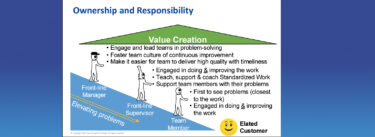In case you missed the last 10 years of news, the Financial Services industry hasn’t exactly put customers first – confusing clients with too many complex instruments that don’t always support a secure retirement. But now the U.S. Securities and Exchange Commission (SEC) is hard at work on a “Personalized Investment Advice Standard of Conduct” that requires advisors to work in their clients’ best interest. For instance, brokers could no longer push higher-fee investments unless they benefit the customer more.
Some sort of intervention is undoubtedly needed in this scenario, but is more oversight the best solution for serving customers? Shouldn’t marketplace natural selection automatically control bad behavior? Customer service and self-regulation may be good long-term, auto-replicating business practices, but sometimes they aren’t enough to stop a chaotic industry driven by more powerful short-term phenomena like greed and self-serving bloat. Biologically speaking, these forces are more akin to eating addictions, and can result in counter-(re)productive outcomes like congestive heart failure.
So what does any of this have to do with lean? Well, our “industry” is over 25 years old now, and it’s getting hard not to look in the mirror and notice we have put on more than a few figurative pounds, too. Yes, lean has successfully spread around the world and gone from manufacturing to nearly every other type of value stream. BUT, we still aren’t sure how to successfully teach it, there’s not much listening to customers (the users of lean) to find better ways of delivering what they really need, and capacity to train/consult/coach/certify/write/talk/broadcast across the social media universe has noticeably outpaced adoption.
Like natural selection, some controlled mutation (in the form of learning experiments, for example) is good for advancing the species; but too many isolated, counteracting, and un-adopted variations can have a negative impact by choking off the propagation of true innovation. Simply put, it looks a lot like lean is being overproduced by complicating and pushing it too hard from the supplier side – and that bloat is risking lean’s survival.
Don’t believe me? In years of discussions with practitioners, clients, consulting colleagues, and even casual outside observers, several recurring questions have emerged:
- Why are there are SO MANY books, articles, and presentations “explaining” lean, yet there is still no consistent definition and it is therefore all left up to the users to sort out? Could variation and confusion be why lean is often muddled with Sigma, Taylorism, Japan, cost reduction, and job cuts? Another source of confusion is Toyota. Is it THE model of lean we should all be following, THE model of how to derive/become lean through respect and problem solving? Or is it one (of many) good examples of synergistic business success factors?
- Why are 99.999% of books, articles and presentations about unbridled success when actual realization (as in sustained transformation) estimates range between five and 25 percent. Isn’t the lean community, of all people, supposed to be discussing problems, gaps, and what we learned from failure so we can get better? This sounds like a pretty critical burning platform for all of us.
- Why do some organizations make much larger, faster, and longer-lasting improvements while expending much less effort? What can we learn from those companies that achieve lean’s benefits with just 20 percent of the effort and only a small fraction of the outside coaching resources? (see article Are We Doing Lean All Wrong?)
- Why don’t more “experts” either have first-hand experience implementing lean in their own organizations or else have spent significant time scientifically researching it in the field? Is Toyota more successful because their teachers have actually used TPS themselves?
- Why do so many coaches make iean so prescriptive and training-/reading-focused? Isn’t efficient and effective learning situational, experiential, experimental, and JIT? (see article Coaches Need Improvement Too)
- Why will the worst offenders nod in agreement with all of this and then bemoan that all the others won’t change?
“Choice fatigue” occurs when consumers are stuffed with too many buying options and not given an easy path to digest them all. In the end, they just feel sick, don’t buy anything, and move on to another venue. If lean becomes too fat (i.e. complex, varied, and meaningless), it will eventually become too hard to convince others to partake – especially if three out of four customers have a negative experience and an Internet connection.
Broken systems often do require intervention or oversight to bring them back into control. The financial industry has the SEC, but there is no Lean Pope (although “John Paul Shook” has a ring to it), no Supreme Court to interpret the Toyota Production System, no lean FDA to issue warning labels, and not even a Bernie Sanders fighting against all those “self-serving elite lean insiders!” There thankfully is, however, a consumer-activist intervention model that can effectively disrupt a chaotic market. It occurs when customers become much more vocal about what they really need, perform due diligence before committing to a purchase, and then share their experiences (both positive and negative) to drive more rapid improvement. There may not be a “Yelp for Lean” yet, but that doesn’t mean we can’t start by answering these questions about your organization’s lean efforts:
- What aren’t you getting from lean today that would make it much easier and more successful in your organization?
- Can you run parallel experiments or at least talk to other organizations that have compared different flavors of lean to learn which worked better in different circumstances?
- Can you talk to other organizations that didn’t succeed to find out why? (Note: be a little skeptical of consultant/writer “Why Lean Fails” lists – there is often little science behind the reasons)
- Is your organization more focused on reading, training, doing more “lean things,” and “doing lean right” than experimenting with how to satisfy customers and run a better business? Could your own behavior be driving unnecessary demand for fat lean?
Don’t get me wrong – there is still A LOT of exciting progress in how to implement lean faster and better. But just like tasty junk food, the nutrients are being offset by excess fat and calories. Without a diet, lean faces the threat of extinction by a thinner, better-looking methodology with a lot more self-control. Please pass the lean lean.






